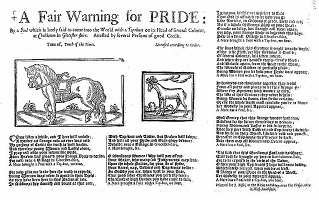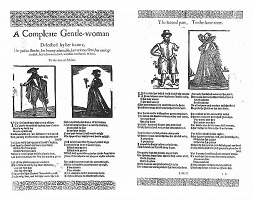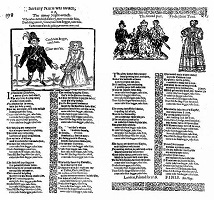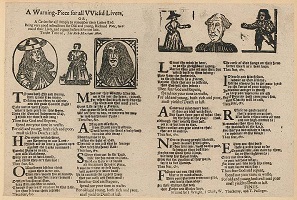Representations of Pride and Vanity
Susan Amussen explains in An Ordered Society: Gender and Class in Early Modern Europe, women of the early modern period submitted first to the rule of a father and then to a husband (Amussen,1). Although some unmarried or widows in early modern Europe did have some legal rights, such rights were limited. As Merry Wiesner-Hanks explains in Women and Gender in Early Modern Europe, one of the main reasons given for excluding women from positions of power was that a woman's first duty was to her husband and household (Wiesner-Hanks,44). When a woman appeared in the public sphere or wielding political power, she transgressed the natural order. She risked her reputation and virtue by challenging the natural dominance of men. Once married a woman was legally subject to her husband in all things. This meant she was not able to sue, draw up contracts, or go to court without a man to support her (Wiesner-Hanks,44). Of course, lived reality often directly challenged this ideal, perspective view of women. Depending on woman's social class, some women did work outside the home.
It is this tension between the ideal and the reality of women's lives that is reflected in the ballads. The unruly housemaid and disorderly wife that appear in the broadside ballads reflect early modern concerns with an ordered society and the need to police even though such ballads examined here.
In the ballad, "A Dialogue between the D. of C. and D. of P. at their meeting in Paris with the Ghost of Jane Shore" the author depicts Jane Shore's story as a cautionary tale to other women. Jane Shore was one of the mistresses of Edward IV of England, and became the mistress of other English aristocrats. Two aristocratic women, known only as Duchess of C. and Duchess of P. show their pride, vanity, and greed by discussing their "charms of wit and Beauty too." The women calculate the benefit of becoming the king's mistress saying, "If you have ought for this great Monarch done, He'l make you then some Abbless or a Nun." Such a brazen discussion by women flies in the face of the ideal for a woamn to submit and be humble. Not only do these two duchesses scheme to gain power and influence with the king, but they are most likely doing so as married women. Intriguuningly, the author has the women scheming to hold power in a more socially acceptable way: abbesses or nuns. This ballad represents these women transgressing against their "natural" roles in society, but the author uses Jane Shore's ghost to police these transgressors and warn them away from such shameful behavior. Jane Shore laments, "[I] gloried in my shame?liv'd in spelendor and enjoy'd delights." The broadside author makes clear to the listener that all women, even the most high-born and ghosts need to control their vanity and pride. Women no matter what their station can be tempted to reach for power, doing this would upset society's structure.

In the ballad, "A Fair Warning for Pride" the author shows another cautionary tale of what happens when woman is too vain or prideful. In this ballad, the author describes women with "invincible pride." The broadside author is explaining that the vanity of young women is causing mares to give birth to foals with a "top-knot." These vain young women are scaring the good Christians and causing the births of unnatural foals with "top-knots."
The broadside author is explaing that the vain young women will visit "sad judgements" on the "whole Nation" for their sin of pride. They are scaring their "good sober" Christian neighbors and, as the refrain makes clear, they are causing farm animals to give birth to monsters."O Monstrous Women! Why will you offend Your maker, who many sad Judgements may send Upon the whole, for your sin of Pride, Your laces, nay, Tower and Top-knots beside: So Gawdy you are, when drest in your Hair, That good sober Christians you perfectly scare; The wrath of high Heaven you have cause to fear, A Mare brought a Foal with a Top-Knot, we hear."

In contrast to the ballads that tell women to cast aside their pride, vanity, and other negative traits there are also ballads who praise women who already do this. In "A complete Gentle-Woman" the author describes the woman as "her person slender, her beauty admirable, her wit excellent, her carriage modest, her behavior chaste." Although the author admires this woman's sterling qualities, he also admires that "Shee scornes ambition, lust, and hateful pride." Here, instead of presenting a shameful example to avoid, this ballad's author provides a positive example for women to emulate. The author has no problem with a woman possessing beauty and wit, so long as she is suitably humble and without ambition. Such a woman can act as the author's muse because she exemplifies the ideal early modern women. Again, reinforcing the idea that a woman who possess all these traits can be sought after, but she must not be prideful or vain about them.

In "Sure my Nurse is a Witch" the author discusses a nurse who is seen as a witch for the song she sings to the baby she cares for. In the song that she sings, she lists many sins that one must not commit. Women are mentioned in negative ways throughout the song, such as vain women, as whores. The nurse is policing other women, as well as men. Overall, the ballad provides, essentially, a laundry list of all the "sinful" things happening in Charles I's reign during the period of Charles' personal rule.

In "A warning piece for all wicked livers" that author polices both men and women warning that they must live virtuously. The ballad author reinforces the religious norms of the time by playing off people's fear of not going to heaven. The author says:
In explaining that people of all ages and classes must die, the author makes clear that death cannot be avoided, no amount of money will save you. References to the eventuality of death and to the Ten Commandments reflects a staunch Protestant outlook, "Swear thou not by the Lord, take not his name in Vain, In Moses Law it is forbid." The ballad author reminds everyone that no matter their gender, age ,or class that they will all meet the same fate and they need to live as well as possible to enter the Kingdom of Heaven."Then fear God and Repent, Spend not your time in waste, For old and young, both rich and poor, must yield to Death at last."

